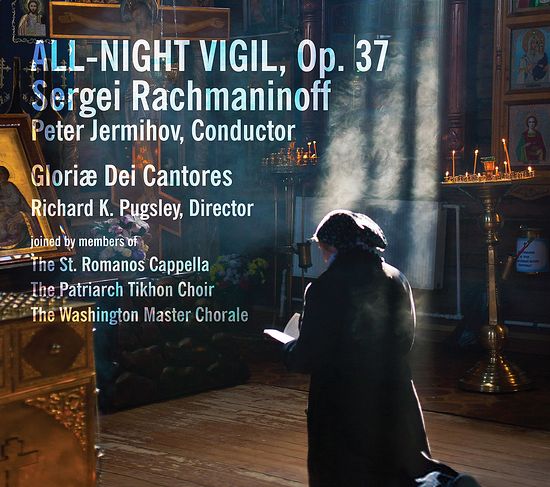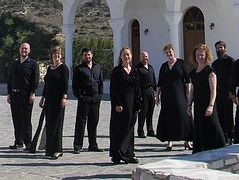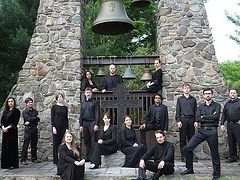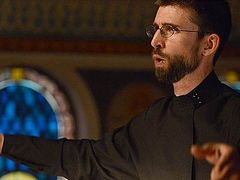Review of “The All-Night Vigil” Op. 37, by Sergey Rachmaninoff, sung by the combined choirs of Gloria Dei Cantores, The Washington Master Chorale, St. Romanos Capella, and the Patriarch Tikhon Choir
Available from Paraclete Press
There are quite a number of recordings in existence that feature Sergey Rachmaninoff’s “All-Night Vigil” (also known simply as “Vespers” by many). There is certainly good reason that this composition is sung and recorded by many choirs throughout the world: It is technically demanding, yet unearthly in its beauty.
This composition itself is considered the very peak of sacred choral music, anywhere. It is also at the same time, a very accessible composition. When one listens to it, it is easy to remember, and so it is also easy to compare one performance of this group to another. I personally believe that it is for this reason that the Vigil is often picked as a project by the finest choirs around the world, to see who can outdo the others in terms of quality of sound, musicality, interpretation and also engineering and production.
The latest entry in this venerable field is Gloria Dei Cantores’ recording of the All-Night Vigil, just recently released in March of 2017. It is a collaborative effort of four different choirs and two extremely expert conductors, and a meeting of both Western and Eastern Christian perspectives in the fields of Church singing and recording artistry.
When I was first made aware of this project I was actually slightly alarmed, because the same work had been released by an extremely expert and renowned group in 2015. Since I worked on this project myself, I knew its quality and I knew that it would be considered as the reference standard for many years, and I did not know how the new project would fare. I knew that it would have to be superb in order to be seen at all, especially coming on the heels of the 2015 project.
So with that in mind, I must say that I am extremely gratified by the Gloria Dei Cantores project. I have listened to this recording multiple times already, and I find qualities in it that really please me.
This recording attains excellence in many aspects—musicianship, the capture of the essence of the Russian Orthodox Christian soul, the expression of the composer, and the excellent interpretation of the conductor. All of these combined in an outstanding way to create a recording that is both new and timeless.
When we deal with sacred singing, all four of these aspects above have to combine in a manner that makes a choir and its conductor transparent, windows through which the grace of God can flow. The point of the Vigil service itself is not to be a concert performance, yet one of the challenges with Rachmaninoff’s composition is that it lends itself as an excellent performance piece, and it is often performed out of its intended context—which is that of the actual Vigil itself.
Yet, despite some scholarly thought to the contrary, this composition was written for the Russian Orthodox Church, and its purpose was for use in the greater body of the All-Night Vigil, with each “movement” being sung in its properly assigned place in the greater whole of that service. That means that the composition is sacred, and it must reflect the spirit of the purpose for which it was written—to glorify God and to lead people through a process of prayer that is deep, complete and profound.
This composition is Church singing, pure and simple, and any recording that represents it cannot be fully what it is supposed to be unless that aspect is presented fully. This is a task because recordings are quite a step removed from the full reality of Church Services, but a good recording of a Church service, or of Church singing, does have the ability to allow us to “enter into” the mystery of the Church and what She is proclaiming to us.
The final aspect is the quality of the recording itself, the technical aspects of capturing the sound of the singers, the production and miking techniques and again, the ability to use all this knowledge as transparently as possible, to deliver to the listener the sacred nature of the material, without calling attention to itself for any particular characteristic.
So, with all that said, the question about this new CD is “does it deliver?”
And the answer is “Absolutely.”
When I listened to this recording for the first time, and multiple times afterwards, I felt as though I was transported to a Russia that is different than the wonderful spirit of Russian Orthodoxy which I usually experience in the fullness of Church singing, here and now in Moscow.
There exists a recording of the Vigil, made by the USSR’s Ministry of Culture Choir in 1986, featuring the soloist Olga Borodina, and conducted by Maestro Valery Polyansky. It is this recording that the new one evokes for me.
The comparison is striking. The Polyansky recording was done in Smolensk, and this new one in a Benedictine Church in the USA, yet the sound is authentically Orthodox and reflects the spirit of Russian Church singing. Perhaps this is influenced by the facts that the conductor, Maestro Peter Jermihov, and a large part of the full choir— the St. Romanos Capella and the Patriarch Tikhon Choir—are themselves comprised of Orthodox Christians, who understand “from inside” the spirit of Orthodox Christian Church singing. It is also a great credit to Gloria Dei Cantores itself, and the Washington Master Chorale, who round out the body of singers in this recording, that the group sings as one choir, with one spirit. The flavor of this music, as the specifically liturgical composition it is, comes through to me as timeless, without a trace of worldliness.
This quality is so authentic that my research into its authorship left me with even greater surprise because the choir and conductor and sound engineer and producer have all worked together to make themselves transparent—and they have even allowed Sergey Rachmaninoff himself to become transparent, and so what flowed from my speakers was the singing of the Church Herself.
This recording is peaceful, expert, absolutely lovely and sublime to listen to. It has a slightly “distant” quality to the sound, compared most notably with the 2015 release of the same work by the Kansas City / Phoenix Chorale I wrote of earlier. However, although I noticed this distance right away, further listening showed me what I would like to call the “auditory context” of this work, and it showed me that it is exactly right. Now, since I sing in a great church choir, I love the feeling of being immersed in the sound as only a singer can hear it. It is a distinct pleasure and I love recordings that reproduce this character. But I also love recordings like this one, that feel like the thought and song of the Church as She prays, and as most of us hear Her pray. And I think this was a bit unexpected for me as an experience, but I understand it and think that what we have here is a real gem.
Maestro Jermihov, Richard K. Pugsley, Keith O. Johnson and Reference Recordings, and the whole body of singers from Gloria Dei Cantores, the Washington Master Chorale, the St. Romanos Capella and the Patriarch Tikhon Choir, all deserve great credit for making this recording a reality. It is truly a great, and very accessible recording, and I am happy to have it in my own collection of audiophile and reference recordings of Orthodox Sacred Church Singing.
Glory to God for all things!
***
“The All-Night Vigil” Op. 37, by Sergey Rachmaninoff, sung by the combined choirs of Gloria Dei Cantores, The Washington Master Chorale, St. Romanos Capella, and the Patriarch Tikhon Choir can be purchased from Paraclete Press.




